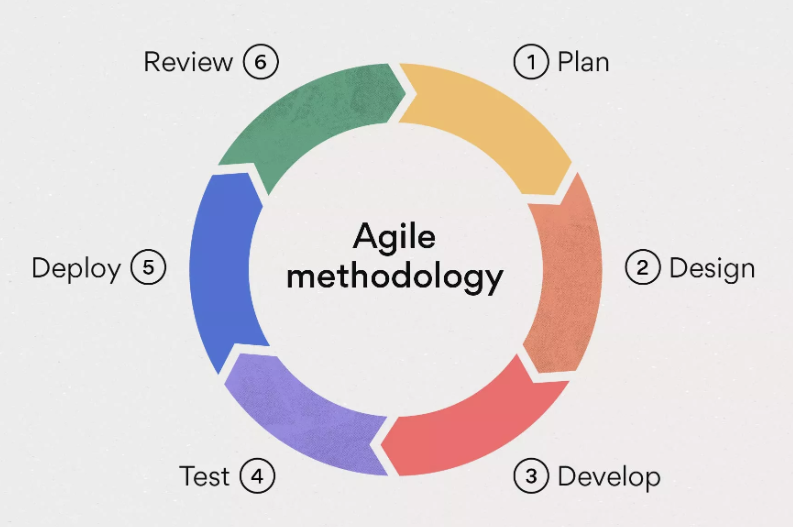Types of Agile Methodology: Assess Which One Works Best for Your Team
Read Time 6 mins | Written by: Emily Tremblay, PMP, PMI-ACP
More organizations are adopting Agile methods, either exclusively or alongside traditional Waterfall techniques, to benefit from its dynamic principles. Agile teams tailor their processes to quickly adapt to changing needs, actively seek early customer feedback, and prioritize individual team members. While each Agile methodology is unique, they all share the core values outlined in the Agile Manifesto. If your organization prizes speed, adaptability, and continuous improvement, read on to find the Agile method that best suits your team.

Scrum
Scrum is one of the most recognized Agile frameworks. Its structures work into short, defined periods called sprints, making it ideal for large organizations that manage multiple products and teams. Scrum fosters continuous delivery by ensuring regular feedback loops and refining work processes.
- Is your organization juggling multiple products or sprints at the same time?
- Could your projects benefit from having multiple Scrum Masters or Product Owners?
- Are you looking for a structured approach to implement Agile?
If so, Scrum might be the perfect fit for your organization.
Extreme Programming (XP)
XP is tailored for software development teams, where two developers work together to ensure high-quality software by continuously reviewing each other’s work. This method emphasizes Agile principles such as fast-paced iteration, continuous feedback, and early customer engagement.
- Is your organization dedicated to producing software-specific products?
- Is your team localized and focused on specialized product development?
- Are you looking to enhance the skills of your junior developers?
If you answered yes to these questions, XP could be the ideal choice for your company.
Kanban
Kanban is particularly effective within lean organizations that aim to boost efficiency, reduce waste, and embrace continuous improvement. It simplifies project management by breaking down work into the smallest possible tasks, often visualized on a Kanban board.
- Is your organization striving to streamline operations?
- Are you in the manufacturing industry?
- Does your team's daily work vary, making it difficult to track large projects?
If so, Kanban could be the right method to simplify your team's workflow, ensuring smoother Agile software development.
Feature-Driven Development (FDD)
FDD is ideal for organizations that require a structured approach to Agile software development. It focuses on developing features in short, incremental cycles while prioritizing customer feedback.
- Does your organization need a structured yet flexible Agile framework?
- Do you require a development method that keeps up with fast-paced industry demands?
- Are you looking for a scalable Agile solution like Scaled Agile Framework (SAFe)?
If so, FDD may be a great fit for your software development teams.
Crystal
Crystal is a lesser-known Agile method that offers extreme flexibility. It uses a ranking method to size teams appropriately, allowing them considerable autonomy in how they manage projects. Crystal relies on strong Agile principles such as collaboration, continuous feedback loops, and adaptability.
- Does your team have significant autonomy?
- Does your team understand and respond well to business needs?
- Can your team quickly assess the impact of prioritizing certain features or defects?
If yes, Crystal is well-suited for highly skilled and self-managing teams, taking Agile methods to the next level.
Dynamic System Development Method (DSDM)
DSDM stands out for its flexibility in both software and non-IT industries. It requires setting clear project foundations, agreed upon by the customer, sponsor, and project members from the start. DSDM supports continuous delivery while aligning with business objectives.
- Do your project teams often disagree on goals and priorities during implementation?
- Does your organization find it challenging to quickly implement Agile principles?
- Are there multiple levels of approval needed within your organization?
DSDM’s structured approach is a great fit for large corporate environments new to Agile.
If any of these Agile frameworks resonate with your organizational needs, it may be time to conduct a formal assessment of your project management practices. As many organizations shift towards Agile software development, the fundamental tenets of Agile methodologies can drive substantial growth. Consulting with an expert in Agile project management can help you define your needs and choose the best Agile approach to lead your team to success.
Ready to Find the Right Agile Methodology for Your Team?
Discover how MustardSeed PMO can help you implement Agile principles tailored to your organization’s needs. Whether you're new to Agile or looking to optimize your existing practices, our experts can guide you every step of the way.
MustardSeed Will Help You Grow Your Business With Little Effort.
Emily Tremblay, PMP, PMI-ACP
Emily Tremblay is a Senior Project Manager with a strong foundation in leading projects within large, complex organizations. She has a proven ability to create and manage new projects from inception to completion, aligning them with strategic goals. Emily excels in supply chain management and project delivery within the pharmaceutical and technology sectors, where her attention to detail and proactive management have consistently driven project success.